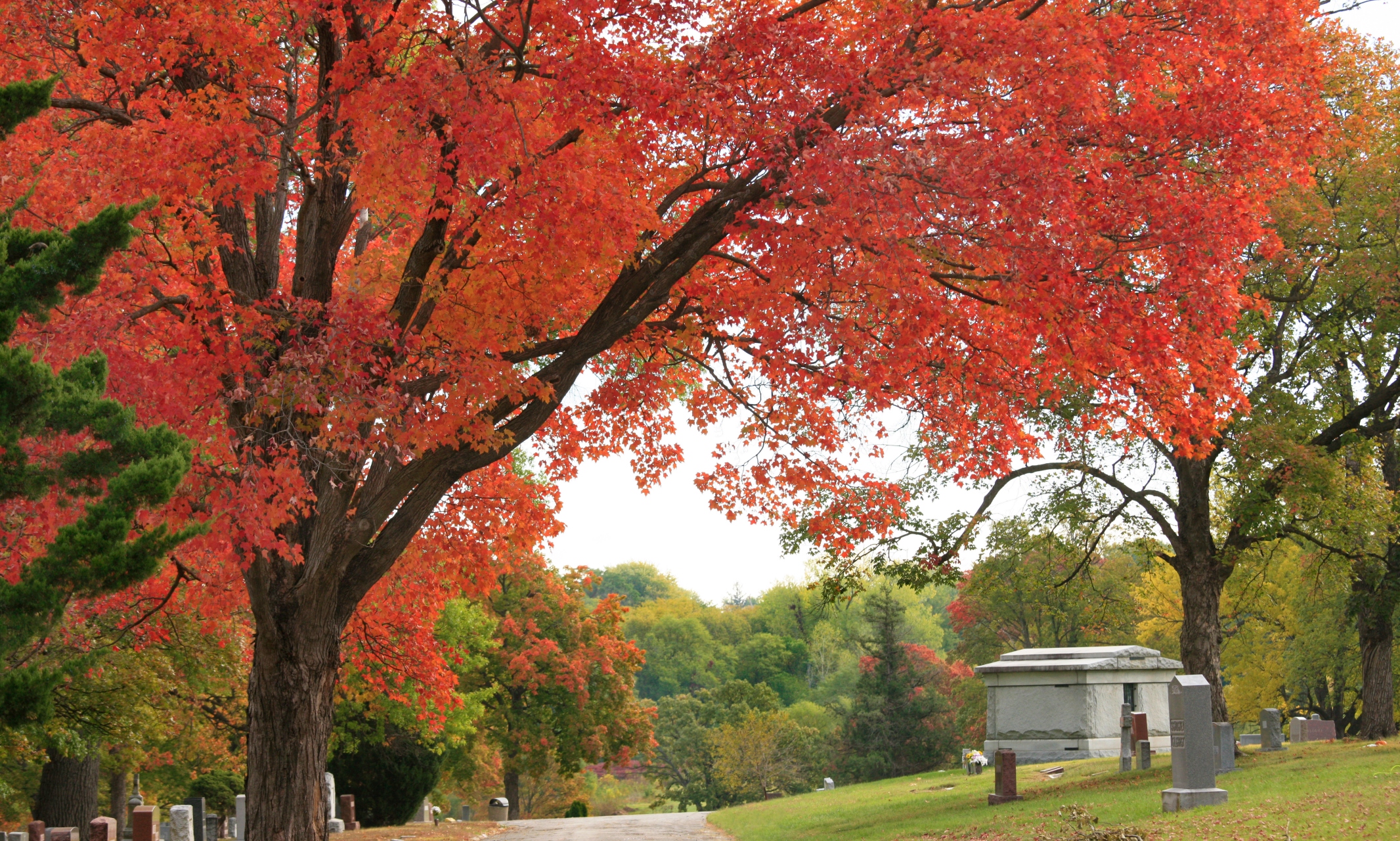
Tina Lasater discovered UMKC history at Forest Hill Calvary Cemetery
While starting work at Forest Hill Calvary Cemetery one morning a few years ago, Tina Lasater (B.L.A. ’03) made a discovery.
Behind a desk, she spied a thick sheaf of parchment papers stuffed into a leather binder. Her find turned out to be a collection of designs and plans created by the cemetery’s architect more than 125 years earlier.
“I was so intrigued,” said Lasater, a client counselor at the cemetery. “When I showed it to my manager, she took me to an area where even more documents were stored.”
Since finding this treasure, Lasater has delved into the cemetery history and the UMKC stories associated with it. Just three miles from the Volker Campus, Forest Hill Calvary Cemetery at 69th Street and Troost Avenue, shares more than a geographical proximity with the university. Many founders and benefactors who established the university and forged its future have their final resting place at the cemetery, established in 1888.
Its 160 acres of rolling hills include unique monuments, grave markers and tributes to those buried and interred there. In addition to being a resting place for those who contributed so much to UMKC and beyond, the cemetery is also a tribute to the present. More than a hundred species of trees from around the world line its winding roads and beautify its graceful landscape.
George Kessler, who served as the landscape architect when the cemetery was created, is recognized for designing the city’s renowned boulevards and parks. Sid Hare, who served as the first superintendent of the cemetery, oversaw the original plantings. Hare challenged the idea of how burial grounds should look and saw the potential for them to be not just a resting place for those who have passed, but a botanical garden for the living.
“When I first saw Forest Hill about 15 years ago, I thought it was so beautiful," Lasater said. "As a UMKC graduate, I love the history of our school and alumni here."
Following are some of those who have made extraordinary contributions to the past, present and future of UMKC.
L.P. Cookingham
From 1940-1959, Cookingham was city manager of Kansas City, Missouri. In 1979, UMKC conferred upon him the honorary degree of Doctor of Humane Letters and later named the L.P. Cookingham Institute of Urban Affairs at the Henry W. Bloch School of Management after him.
Oliver Hayes “O. H.” Dean
A lawyer and judge, Dean was also a founder of the Kansas City School of Law in 1895. He served as the school’s vice president from 1895-1902 and president for the next 25 years. He added the post-graduate program and oversaw construction of the law school in 1926, to which he donated his personal law library.
Tatiana Dokoudovska
A world-renowned ballerina, Dokoudovska joined the Conservatory of Music in 1954 as head of the ballet department, a position she held until her retirement in 1989. She initiated UMKC’s bachelor’s degree in dance at a time when few such programs were available in the United States. A choreographer and artistic director, she founded the Kansas City Civic Ballet, which later became the Kansas City Ballet.
An outgrowth of the Conservatory of Music’s recital program, she developed the Ballet from its humble beginnings to a nationally recognized company.
Uriah Spray “U.S.” Epperson
Banker, industrialist and philanthropist, Epperson hired eccentric French architect Horace LaPierre to design a monumental mansion at 52nd and Cherry streets for himself and his wife, Mary Elizabeth Weaver Epperson. Construction on the house began in 1919 and was completed in 1923 at a cost of nearly $500,000. The four-story Tudor-Gothic structure contained 54 rooms, including six bathrooms, elevators, a swimming pool, billiard room, barbershop and a custom organ. After the death of Mary Epperson, the home was donated to what is now UMKC.
Since that time, the house has been rumored to be haunted by Harriet Barse, an organ instructor at the Conservatory who lived with the Eppersons. Reports of the haunting include the appearance of Barse’s ghost and organ music coming from the mansion’s basement.
Lena Haag
Born in 1864, Haag left home in 1879 to attend the Moravian Seminary for Young Ladies in Pennsylvania. An exceptional pianist, her interest in art and music developed at the school. After graduation, she returned to Kansas City and continued her studies in art. In 1936, she made an anonymous donation of $225,000 to the university. This donation, kept anonymous until her death in 1951, provided funding for the construction of Haag Hall, endowment and student loan funds and the fine arts program.
Herbert F. and Linda Hall
Herbert and Linda Hall lived in a 1913 mansion at 51st and Cherry streets. Upon her death in 1938, Linda Hall established an endowment for a free, specialized library. Her husband left additional millions of dollars for the library, which he instructed be named for his wife. In 1946, the Linda Hall Library opened in the couple’s mansion. In 1964, the library relocated to a new structure next to the Hall’s home. Independently funded and operated, Linda Hall Library provides resources to researchers around the world.
Charles Francis Horner
In response to area demand for musical education, Horner founded the Horner Institute of Fine Arts in 1914, which he headed until 1934, eight years after it became the Kansas City Conservatory of Music.
Ernest Newcomb
Founder of the University of Kansas City, Newcomb wrote the school's charter, hired faculty, outlined the courses and opened the university. While establishing the school, Newcomb collaborated with businessman and philanthropist, William Volker, who donated the land for the campus. Newcomb left the school in 1938 but was publicly acknowledged as the father of the university in 1977.
Elmer F. Pierson
Founder of Vendo, a vending machine manufacturer, Pierson donated $250,000 for Pierson Auditorium and established the John B. Gage Lecture and Fellowship Fund.
Kenneth Aldred and Helen E. Foresman Spencer
Kenneth Spencer was a third-generation coal mine owner and one of the original founders of MRIGlobal. Generous philanthropists, he and his wife, Helen Spencer, provided the financial gift for the Spencer Theatre, the original home of the Missouri Repertory Theatre.
Edward F. Swinney
A Kansas City School Board member and president of the American Bankers Association and the First National Bank of Kansas City, Swinney established the Edward F. Swinney Trust, and the Swinney Recreation Center bears his name.
William Volker
Businessman and philanthropist, Volker’s generosity left an enduring impact across UMKC and the Kansas City community. He donated 40 acres and a house to launch the University of Kansas City (now UMKC) and contributed more than $2.5 million for its campus and structures. The Volker Campus is named after him. Known as “Mr. Anonymous of Bell Street,” Volker also quietly provided assistance for those in need across the city, along with millions of dollars in gifts to philanthropic organizations and projects.
Hazel Browne Williams
The first African American full-time professor at UMKC, Williams became an associate professor at the School of Education in 1958 and was a full professor in secondary education in 1960. She retired in 1976, after serving on the faculty for 18 years, and was granted emeritus status — the first Back person to receive this honor from UMKC.
Oct 31, 2023
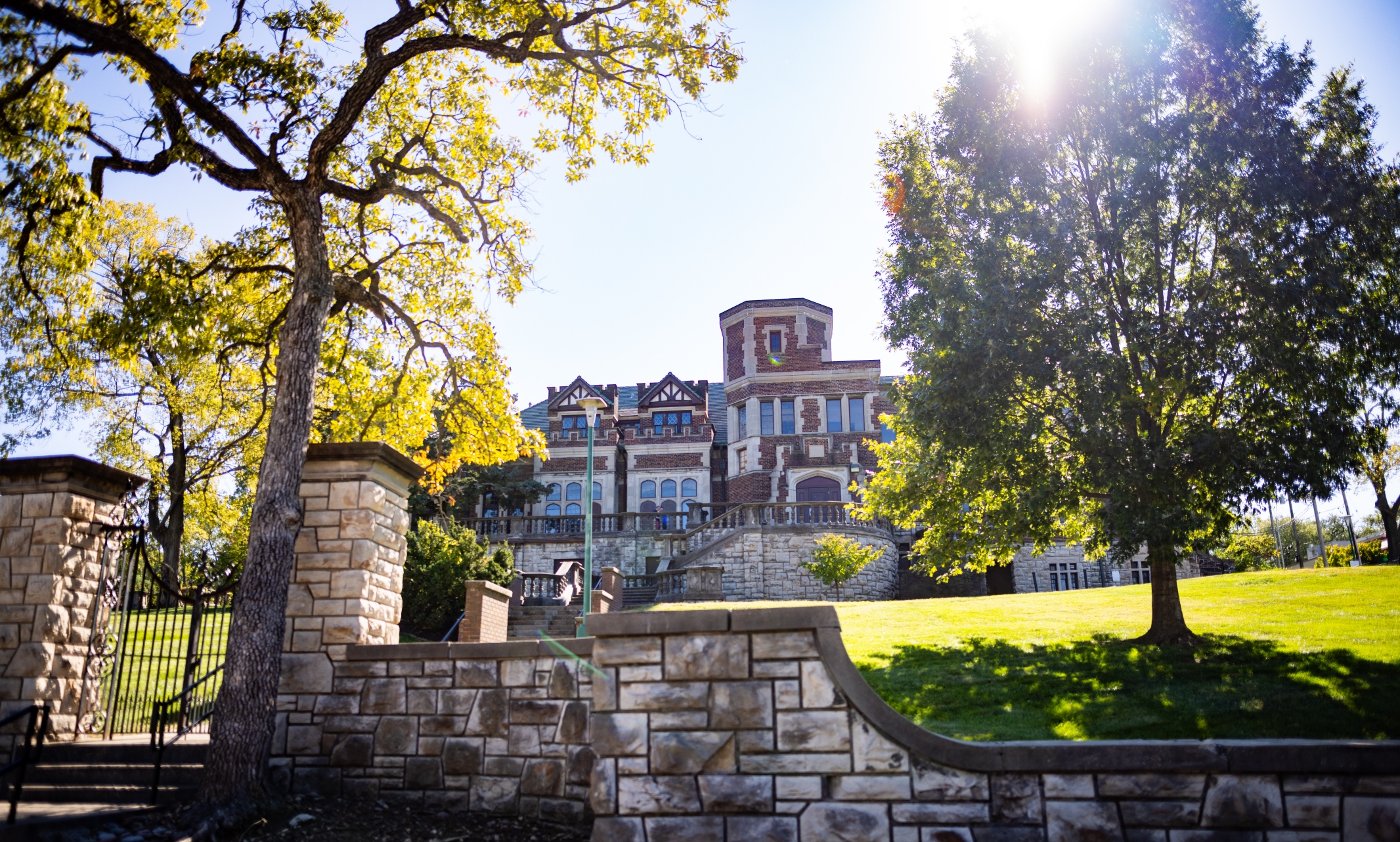
The historic building is said to have a haunted past
For decades, UMKC faculty, students, staff, even police officers, have shared history and folklore of the mysterious Epperson House
In November 2023, the university issued a request for proposal for a potential public-private partnership to restore and repurpose the home.
While its haunted past is a topic for debate, one thing is for sure, it’s a storied tribute to Kansas City’s history, but few have had a look inside its walls. Below are details of the home’s origin and owners, campus legend and a rare look inside one of the most captivating buildings on campus.
Built in 1920, Epperson House was the home of Kansas City insurance tycoon Uriah Epperson and his wife, Mary. The 54-room mansion cost $500,000 and was a blend of a castle and Tudor-style home.
The Eppersons were patrons of music and the arts. Among the charities they supported was the Kansas City Conservatory, now-known as the UMKC Conservatory. Their grand home included a Great Hall, where they would host friends and included a stage, where they would arrange for performances.
Above the Great Hall, sits a custom organ loft. Though childless, the Eppersons befriended Harriet Barse, an organ instructor from the Conservatory whom they regarded as their adopted daughter. Barse even moved into Epperson home. She commissioned the organ and intended to entertain guests, but she fell ill and died before the organ was installed. While she never played the organ during her lifetime, it is the topic of strange encounters reported in the home, with reports of organ music coming from the basement.
Following the death of Uriah and Mary Epperson, the home was donated to the university. Its first use was as a dormitory for Navy air cadets during WWII. The cadets reported seeing a ghostly woman in a white gown walking the halls of the home.
Throughout the decades following the war, the home was used as a residence hall and in the 70s, a practice space for the UMKC Conservatory. It was during this time that stories of strange phenomena inside Epperson House increased.
Students reported hearing footsteps in empty parts of the home. And the light at the top of the home’s tower would turn on by itself even though the tower had been sealed off decades before.
A custodian had a close call when a chandelier came loose in the living room, narrowly missing the staffer. And a police officer reported being at Epperson House when his patrol car was hit. He got out to find skid marks, but not another car in sight.
These days, there is no access to Epperson House and the building is in need of repair. However, the university is hopeful about potential for Epperson House’s reuse.
Oct 31, 2023
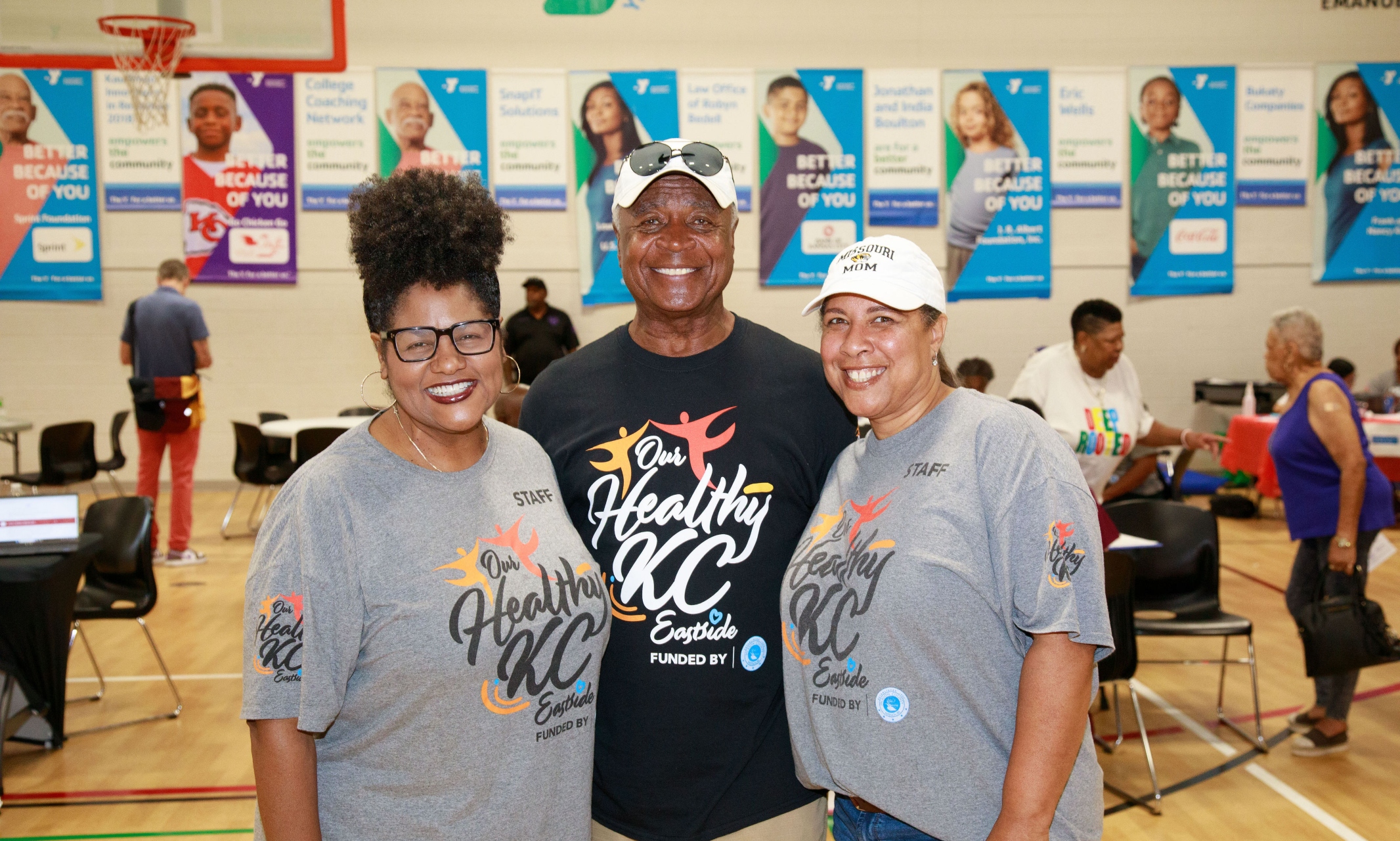
Association of American Medical Colleges recognizes service to Kansas City area
The University of Missouri-Kansas City School of Medicine has received the prestigious Spencer Foreman Award for Outstanding Community Engagement from the Association of American Medical Colleges.
The award highlights the university’s longstanding commitment to supporting the Kansas City area and its underserved populations. According to the AAMC, UMKC has displayed unwavering dedication to reaching community members through nontraditional avenues of health care with low- and no-cost clinics, community events, education opportunities and more.
The School of Medicine is the only recipient of this award in 2023, further cementing its reputation of inclusion and community success. To School of Medicine Dean Mary Anne Jackson, M.D., this award is a checkpoint, rather than a finish line.
“We are honored to receive this award, not only for the recognition of our hardworking students, staff and faculty, but for the visibility this brings to schools of medicine, like ours, that seek to better the community,” Jackson said. “Being a medical professional and working with wonderful collaborators at the School of Medicine and our affiliates is choosing every day to deliver the highest level of care to all people, regardless of who they are or where they come from. Connecting with the community through our many outreach efforts is teaching our students that optimizing care for all can occur in real time, and I can’t wait to see what more we can accomplish together.”
More than 60 key community partnerships help make university outreach successful. Strong bonds among UMKC and businesses, faith groups, neighborhood organizations, youth groups and local leaders have all played a key role in identifying areas of need and how UMKC can best serve.
One of the champions of community engagement, Jannette Berkley-Patton, Ph.D., director of the UMKC Health Equity Institute, has been spearheading these efforts throughout her career at the university.
“We’ve received this honor because of our stellar community partners, staff and students who are committed to improving the health of Kansas Citians,” Berkley-Patton said. “We are being recognized on a national level because of their desire to make the world a better place, and I am honored to have a part in this community engagement journey. Thank you to everyone involved who has made this work possible.”
Jackson County Executive Frank White Jr. has played a key role in Our Healthy Jackson County’s success.
“This award is a special opportunity for our community to recognize all the hard work that UMKC and their community partners, staff and students do to bring health care to Jackson County," White said. "Seeing the community become healthier together is proof that the Our Healthy Jackson County program needs and deserves the county’s investment now and in the future. With the support of UMKC, we are truly making a difference in our residents’ lives and it’s rewarding to know that our work is being recognized on a national level for others to follow."
In an online award presentation Oct. 25, the AAMC noted that the impact of the university is “Evident in its outcomes,” citing the success of Our Health Jackcon County and the university’s partnership with KC Faith Community Action Board.
Jackson and Berkley-Patton will accept the award Nov. 5 at an AAMC conference in Seattle.
AAMC presenters said: “Community engagement at UMKC has a profound impact on learners, helping them to become more compassionate practitioners. When sharing his experience with the Community Health Research Group and the Health Equity Institute, led by Dr. Jannette Berkley-Patton, fourth-year medical student Alex Geyer notes, ‘engaging with the community face-to-face, outside of the clinical setting, will help me be a physician worthy of my patients’ trust and serve as a role model for future budding physicians.”
Oct 30, 2023
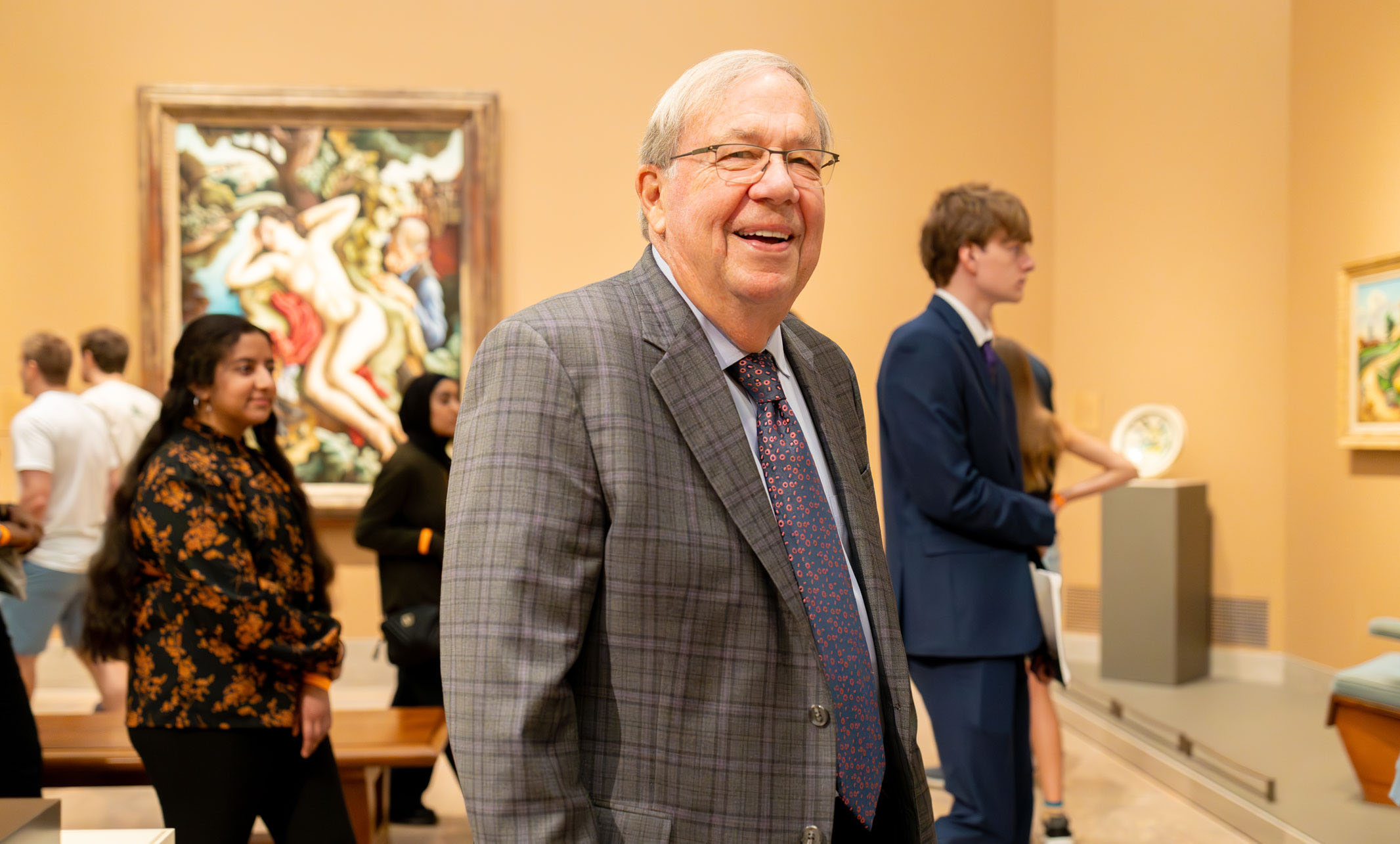
UMKC faculty member and alumnus helps medical students connect art and medicine
William Ritter, M.D., (M.A. ’18), looks at a painting or a sculpture of the human body by Michelangelo or Leonardo Da Vinci and sees more than a famous work of art. He sees a history of medicine. Every year, he shares his insights with students at the UMKC School of Medicine, describing the intersection of art and medicine and how one has spurred the other throughout the centuries.
“There’s a lot of commonality between art and medicine,” Ritter said. “Just go to Michelangelo and Leonardo -- they were the first anatomists. You go back and look at a lot of their paintings, it’s all anatomy. They were the first ones to dissect the human body, so the Renaissance is really the birth of anatomy, the birth of everything: art, the liberal arts. Art history is really the crux of early medical studies, medical thinking, dissections, and it keeps going on and on.”
This Fall, Ritter, who also holds a master’s degree in art history from UMKC, begins his sixth year in the School of Medicine’s Sirridge Office of Medical Humanities and Bioethics as course director of an elective in medicine and the visual arts. He also teaches the class in the Spring, and serves as a docent for first- and second-year medical students.
“We try to make it interesting,” Ritter said. “We give them a little medicine and how it ties to art history. I give them a lot of art history, actually, because I like doing it, and it’s a nice variation. It’s a way to do both art and medicine and get away from just medicine.”
School of Medicine Dean Mary Anne Jackson, M.D., said Ritter’s work is an ideal example of what Marjorie and Bill Sirridge, two of the school’s founding docents, envisioned when they endowed the office in 1992 to expand humanities course offerings for both premedical students and students in UMKC’s six-year B.A./M.D. program.
“I am so grateful for Dr. Bill Ritter, whose work at our School of Medicine embodies the vision of the Drs. Sirridge,” Jackson said. “Early clinical experience in medicine is foundational to our school, and as a Year 1 and 2 docent, Dr. Ritter teaches our students the fundamentals of medicine, but also allows them to experience the human side of medicine through the arts.”
Ritter realized his interest in art and art history while he was in school. But studying to become a doctor took precedence, and college electives in art history gave way to courses leading to a degree in chemistry, followed by medical school. Ritter graduated from Philadelphia’s Sidney Kimmel Medical College, Thomas Jefferson University in 1971. He trained in internal medicine at Emory University, followed by a cardiology fellowship at the University of Texas Southwestern.
“There wasn’t much art when I was in medical school for sure,” Ritter said.
But his passion for art never waned, even after he became entrenched in a career as a cardiologist. One night before dinner with friends, a member of the group, who also happened to be a guide at Kansas City’s Nelson-Atkins Museum of Art, took everyone on a tour of the museum. Ritter was immediately intrigued.
“My eyes really lit up,” he said. “I said, ‘I’d like to show off Monet, stand there with a Monet and tell everybody about it and what I know about it.’ I thought that was really cool. So I ended up joining the Nelson as a museum guide (in 2008).”
For nearly 10 years, Ritter walked the hallways of the Nelson-Atkins and the Kemper Museum of Contemporary Art on weekends and evenings as a guide and docent, sharing his love and knowledge of the fine arts with the museums’ visitors.
Several years ago, Ritter and his practice partner sold their cardiology practice after 30 years. With some free time, he decided to dive deeper into his art interest. Ritter went to the UMKC Fine Arts building, where he met art history professor Burton Dunbar, who would become a close friend and mentor. Over the next 2 1/2 years, Ritter studied art history, earning his master’s degree in 2018.
He began at the School of Medicine five years ago developing the arts and medicine course and serving as a docent, a role that allows him to introduce medical students to their earliest patient encounters.
“I’d never done much teaching before — a little bit clinically — but nothing formal,” Ritter said. “It turned out, I think maybe it was my calling. Maybe I should have been doing this sooner.”
His passion for teaching, just like his love for art history, blossomed, and two years ago medical students honored Ritter with the Outstanding Years 1 and 2 Docent Award, given annually by students to one instructor for his or her pursuit of teaching excellence in medicine.
“I think I have a natural interest in teaching students,” Ritter said. “That’s what helps in getting along with students and being successful. You’ve got to be one of them.”
Oct 23, 2023
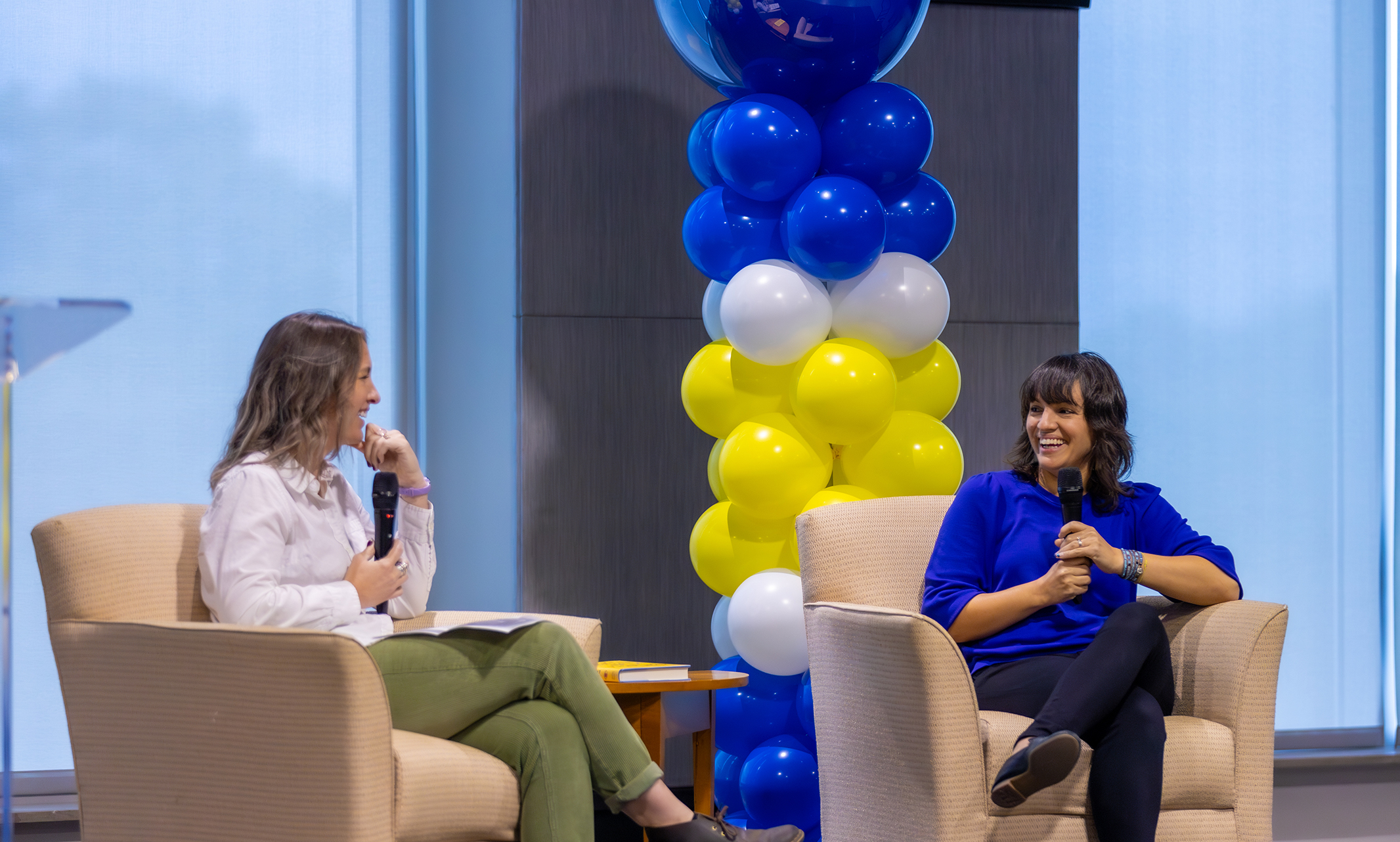
Roos Read selection writer visited campus to speak with UMKC community
Mónica Guzmán, author of this semester’s Roos Read selection, "I Never Thought Of It That Way: How to Have Fearlessly Curious Conversations in Dangerously Divided Times,” visited the UMKC Volker campus for an author talk this month.
Guzmán’s book offers insights and tools to connect with people whose views differ, a little or widely, from yours. Guzmán’s book aims to shed light on blind spots and bring people back together.
“Mónica is a journalist and storyteller who isn’t afraid to ask hard questions or to answer them,” said UMKC Chancellor Mauli Agrawal. “Her life experiences, both personal and professional, drove her to explore why our communities feel so divided. What she found is that one of our most powerful tools in breaking down barriers is our own curiosity. When we ask questions and lean on our natural curiosity, we can understand each other and even learn from each other.”
During the author talk, Guzmán answered questions from moderator Jessica Gantt-Shafer, Ph.D., assistant professor of communication at the UMKC School of Humanities and Social Sciences, as well as questions from the attendees. Here are five bits of wisdom she shared over the course of the talk.
“I was someone who wanted to get it right all the time. I was careful and cautious, but I also found people fascinating. At my internship right out of school, I was so scared to pick up the phone. My shyness went up against my need to know these people, and it lost.”
“Belonging is the most important call there is. Being understood and giving people understanding creates community.”
“Feel like you aren’t connecting? One thing you can try is a pivot: ‘I see it differently. Can I tell you how I see it?’ People will hear more when they are heard.”
“Need to challenge your thoughts? Try to figure out who you’re talking about but never with. If your views feel condensed and simple, look for the complexity.”
“How do you disagree with someone who thinks you shouldn’t exist? ‘Am I allowed to exist in a world you think is good?’ That gives them a lot of power. Who are they to say who exists? Maybe the most powerful way to argue against people who think you shouldn’t exist is to keep on existing. Existence is power.”
This is the inaugural year for Roos Read. The campuswide initiative was launched by the Office of the Chancellor and facilitated by the Division of Diversity and Inclusion. Its goal is to encourage UMKC students, staff, faculty and community members to read a recommended title that showcases a distinctive voice, perspective or theme and engage in discussions intended to generate action toward change.
Oct 23, 2023
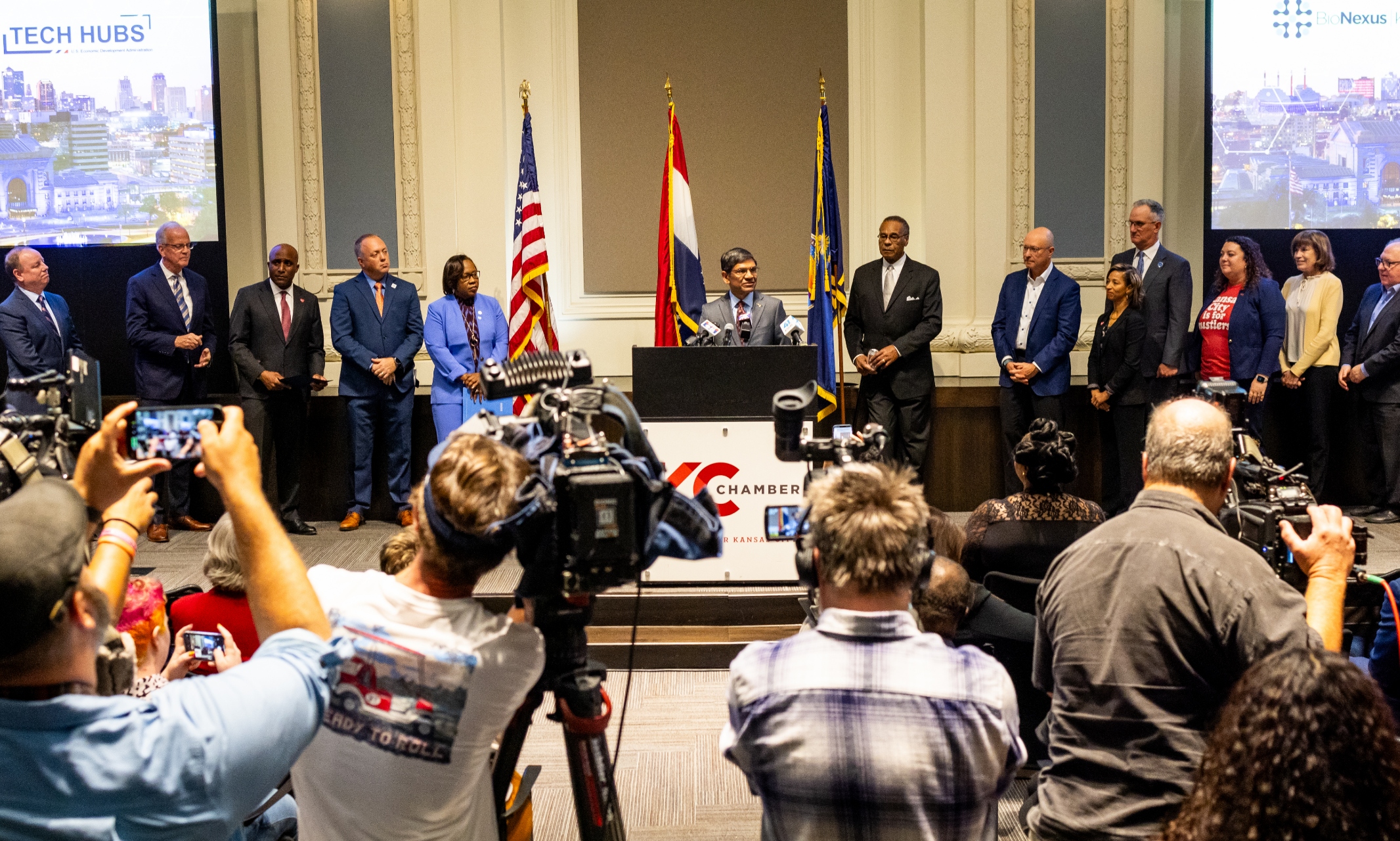
UMKC played significant role in U.S. Economic Development Administration designation
The U.S. Economic Development Administration has named the KC region and Missouri “Tech Hubs” as part of a historic investment to strengthen the U.S. economy and national security - and the University of Missouri-Kansas City played a significant role in this recognition.
UMKC Chancellor Mauli Agrawal, along with national and other local leaders, spoke at an announcement event at the Greater Kansas City of Commerce boardroom at Union Station.
"The new Tech Hubs designation provides great scope for innovation in Kansas City – and I can envision all the groundbreaking advancements to come as our UMKC students, faculty and staff work in collaboration with the many fantastic organizations in the greater Kansas City area," Agrawal said. "We at UMKC could not be more excited."
Maria Meyers, executive director of the UMKC Innovation Center, speaks with UMKC Chancellor Mauli Agrawal and Anthony Caruso, associate vice chancellor for research at UMKC.
The regional proposal, Kansas City Inclusive Biologics and Biomanufacturing Tech Hub (KC BioHub), led by BioNexus KC, of which the university is a member, UMKC and more than 60 partner organizations, will ramp up life-saving vaccine production and other preventative technologies to leverage regional assets and the existing ecosystem to become a global leader in biomanufacturing and life sciences. KC BioHub can now apply for phase 2 funding of up to $75 million.
"The Tech Hubs designation is not just a title; it's a reflection of the dedication and hard work of the entire Kansas City community," said Maria Meyers, executive director of the UMKC Innovation Center. "It highlights our shared commitment to innovation and our ability to harness our collective potential. The UMKC Innovation Center is excited to play a pivotal role in this journey, and we can't wait to witness the advancements that will emerge from this exciting collaboration."
Agrawal said the Tech Hubs designation and the opportunity that comes with it, is a natural next step for the community, and one UMKC has been preparing for.
In 2022, UMKC received a $12.97 million grant from the Kauffman Foundation to increase entrepreneurship programming and technology commercialization. This grant expanded existing programs and allowed for the creation of new ones, with the goal of reducing barriers to entrepreneurship and technology innovation and commercialization.
In 2023, UMKC unveiled the next steps in its planned expansion of the UMKC Health Sciences District with the Healthcare Delivery and Innovation Building, a physical space designed to fuel innovation. That $120 million building will house key assets for research, technology and engineering. One of these assets is the Data Science Analytics and Innovation Center, which is focused on creating new advances in data sciences to transform the way we personalize healthcare and contribute to new discoveries.
UMKC Chancellor Mauli Agrawal speaks about the Kansas City region - from Manhattan, Kansas to Columbia, Missouri - being designated a Tech Hub at an announcement event.
Across Missouri, UMKC also contributed to another Tech Hub. The Critical Minerals and Materials for Advanced Energy Tech Hub, led by the University of Missouri System, aims to position south-central Missouri as a global leader in critical minerals processing to provide the materials needed to support battery technology.
This Tech Hub will build on the region’s mineral-rich geography, expertise in hydrometallurgical refining and existing assets to increase processing capacity to convert minerals into materials necessary for advanced energy and critical goods, including lithium-ion and primary-lead-acid batteries. In doing so, the Tech Hub seeks to meet the demand of U.S. advanced energy manufacturers and reduce dependence on foreign critical minerals while creating thousands of good-paying jobs.
"The region possesses the natural resources, transportation infrastructure, workforce, workforce training, expertise and incumbent corporations necessary to build a thriving critical materials circular economy; the same is true of the foundational elements for biologics manufacturing," said Anthony Caruso, associate vice chancellor for research at UMKC. "In both cases, the impact is directed to the taxpayer and U.S. national and economic security."
Tech Hubs was passed with the CHIPS and Science Act of 2022 and has authorized $10 billion for the program over five years. The goal of the federal program is to give an economic push to communities like the KC region. It is expected to drive new technologies to provide the U.S. with a competitive edge against other countries, driving economic growth and training for tech workers.
The KC region and Missouri were two of the 31 Tech Hubs chosen from more than 370 applications.
In 2025, the U.S. Department of Commerce’s Economic Development Administration (EDA) announced that it plans to award an additional $29 million to The Critical Minerals and Materials for Advanced Energy Tech Hub as part of a new round of funding from Congress.
Oct 23, 2023
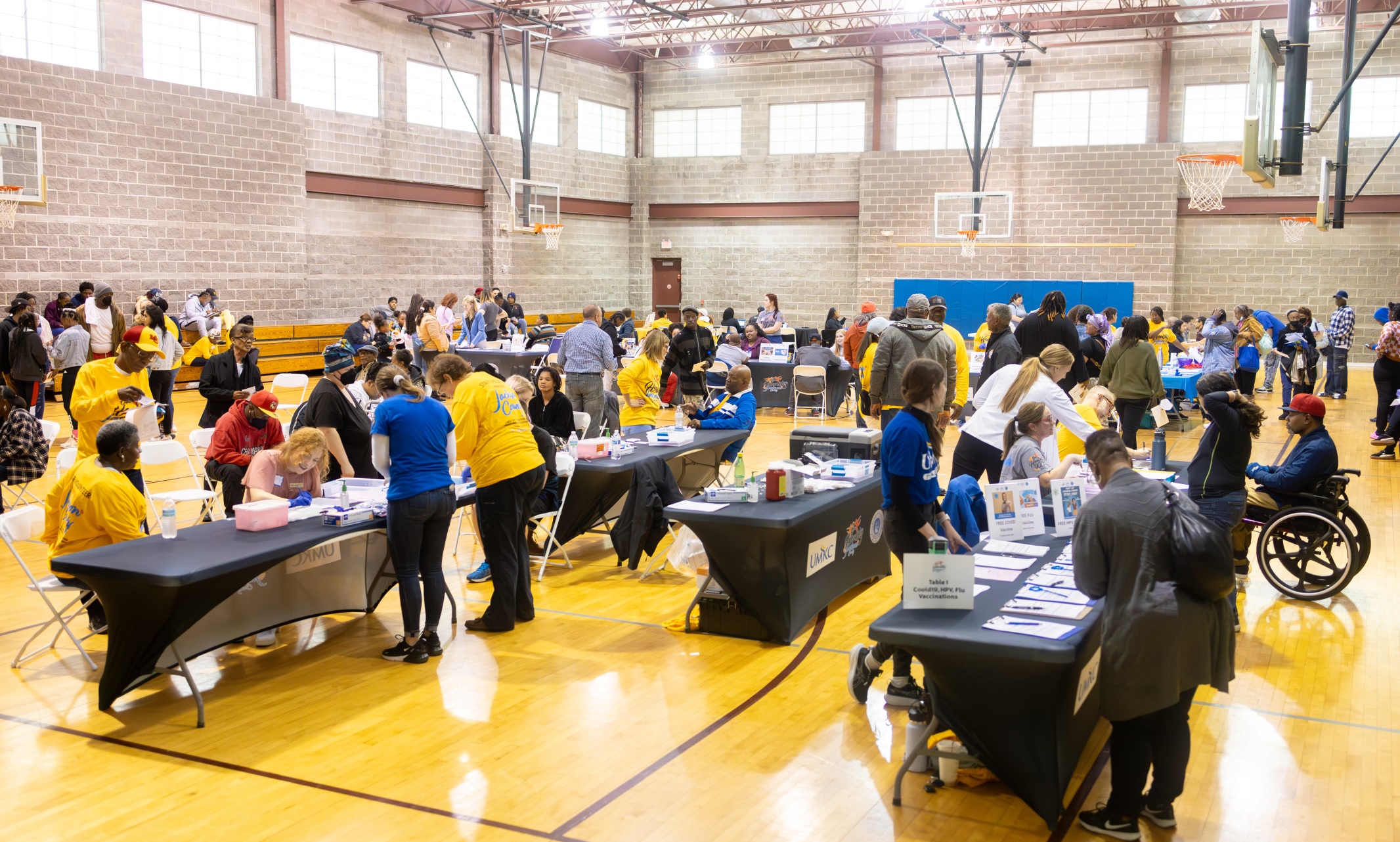
Our Healthy Jackson County is bringing health care to the people
The Gregg/Klice Community Center in Kansas City was buzzing on a recent Saturday afternoon with a DJ, free food, balloon animals and a bounce house, thanks to community initiative Our Healthy Jackson County. Amid the family fun, residents also received cancer screenings, vaccinations and a variety of other free health services.
Led by Jannette Berkley-Patton, M.A., Ph.D., director of the UMKC Health Equity Institute, the community initiative is dedicated to promoting equity and access to vaccinations and other health and community services. Formerly Our Healthy Kansas City Eastside, the program has expanded its services and community footprint to all of Jackson County, thanks in part to Jackson County, which awarded $5 million in funding for the next phase of the program.
According to Berkley-Patton, it’s a great example of collaboration among UMKC, Jackson County, neighborhood leaders and the business sector.
“First and foremost, it speaks to County Executive Frank White and the rest of the Jackson County Legislature recognizing that there are significant health disparities in Jackson County that need to be addressed,” Berkley-Patton said. “We have underserved populations that have told us how valuable these services are to them.”
White attended the event Saturday and noted that the initiative has become a valuable resource for the community.
“Dr. Berkley-Patton and the groups she works with have done a great job getting people to come out and take ownership of their health,” he said. “This is a legacy for us all that we can be proud of. When you see how many people have turned out here today, it tells you how many people lack access to health care.”
The kickoff event for the expanded initiative offered a variety of free health services, including COVID-19, flu and HPV vaccinations; blood pressure and blood sugar checks; mental health, STI, cancer and dental screenings; and smoking cessation resources. Those taking advantage of these services received cash incentives for participating.
One community member who showed up for his COVID-19 and flu shots Saturday was Kansas City civic leader and former City Council member, Alvin Brooks.
“I’m 91 and I want to stay healthy,” Brooks said. “God has been good to me, and this is me trying to be good to myself. I’m glad to see so many people from the African American community here. I know so many of them. This is certainly a success. There was a line out the door.”
Indeed, the success of the first phase has been clear. Our Healthy Kansas City Eastside provided 12,942 vaccinations and delivered 4,152 instances of health services in 2021 and 2022. At the most recent Our Healthy Jackson County event, nearly 170 community members attended and 141 received vaccines. But the proof of success also has been evident in the feedback Berkley-Patton received directly from community members.
“I remember talking to one woman who was a new grandmother,” Berkley-Patton said. “She was so excited to get her COVID-19 vaccination because she knew that not only was she protecting herself, but also protecting her grandchild that she was so eager to see.”
Kansas City home health-care worker Latonya Drew echoed that sentiment Saturday as she received her vaccine. She had her clients’ health and well-being in mind as she got her shot. She said she appreciated that the initiative is brought to the neighborhoods where people live.
“This is good for people who don’t have transportation to get here,” Drew said. “Coming here, you get a lot of information, and you get to know your community.”
UMKC health sciences students and faculty play an integral role keeping these essential services free for Jackson County residents. Students and faculty from the Schools of Dentistry, Medicine, Nursing and Health Studies and Pharmacy were on hand providing screenings, vaccinations and answering health questions.
“How often can you just walk up to a doctor and ask a question, no waiting for an appointment?” Berkley-Patton asked. “It can make a world of difference having this level of access to health-care providers in a setting that folks frequent and trust.”
According to Berkley-Patton, the experience is pivotal for UMKC health sciences students, providing them with a better understanding of the importance of preventive care. Through providing screenings and health-care education, students see how a small intervention in someone’s life can have lasting effects for overall health. The event also provides students an opportunity to work in the community, where they hear first-hand the effects of social determinants of health, such as transportation issues, food insecurity or lack of insurance.
Student Micah Anderson (Pharm.D. ’24) first encountered the program by chance at her local grocery store. She was shopping and happened across one the organization’s original events. She has lived all her life in Jackson County, and seeing people from UMKC giving back to her community was transformative.
“It was really impactful,” Anderson said. “Seeing my classmates and faculty at UMKC helping the people I see at the grocery store and the pharmacy.”
As soon as the opportunity to volunteer with the organization came up, Anderson jumped at the chance to help her community.
“These are the people who have motivated me, encouraged me in my pursuit of pharmacy,” Anderson said. “This opportunity is really important to me, using the skills and clinical knowledge that I’ve developed at UMKC to give back to the people that have poured so much into me.”
On Saturday, Anderson conducted blood sugar and blood pressure screenings for three straight hours.
“We’ve been really busy,” she said. “We haven’t stopped the entire time.”
Third-year pharmacy student Jessica Thomas spent the event giving vaccinations.
“It makes me feel like pharmacists really have a role in our community,” Thomas said. “We are having an impact on the health of the community, and I love that.”
The health-care providers involved with Our Healthy Jackson County are also helping to address the rising rates of diabetes in Kansas City as well as the area’s high infant mortality rates, an issue Missouri Gov. Mike Parson has identified statewide. Berkley-Patton is excited to launch the organization’s new maternal health program, which supports women of reproductive age with family planning counseling and an immediate appointment with an OB/GYN in the University Health Women’s Care Clinics.
The organization uses a unique approach in building the structure of Our Healthy Jackson County, pairing community stakeholders with UMKC experts who are established in these communities.
“I have been doing community-engaged research at UMKC now for almost two decades,” Berkley-Patton said. “I am born and raised in Kansas City, so to be able to do this work in my own backyard gives me goosebumps. Seeing thousands of people get the COVID-19 vaccination and much-needed health screenings, seeing the hundreds of volunteers coming together, that’s the stuff that gets me excited and increases my passion for the work we are all doing.”
Oct 18, 2023
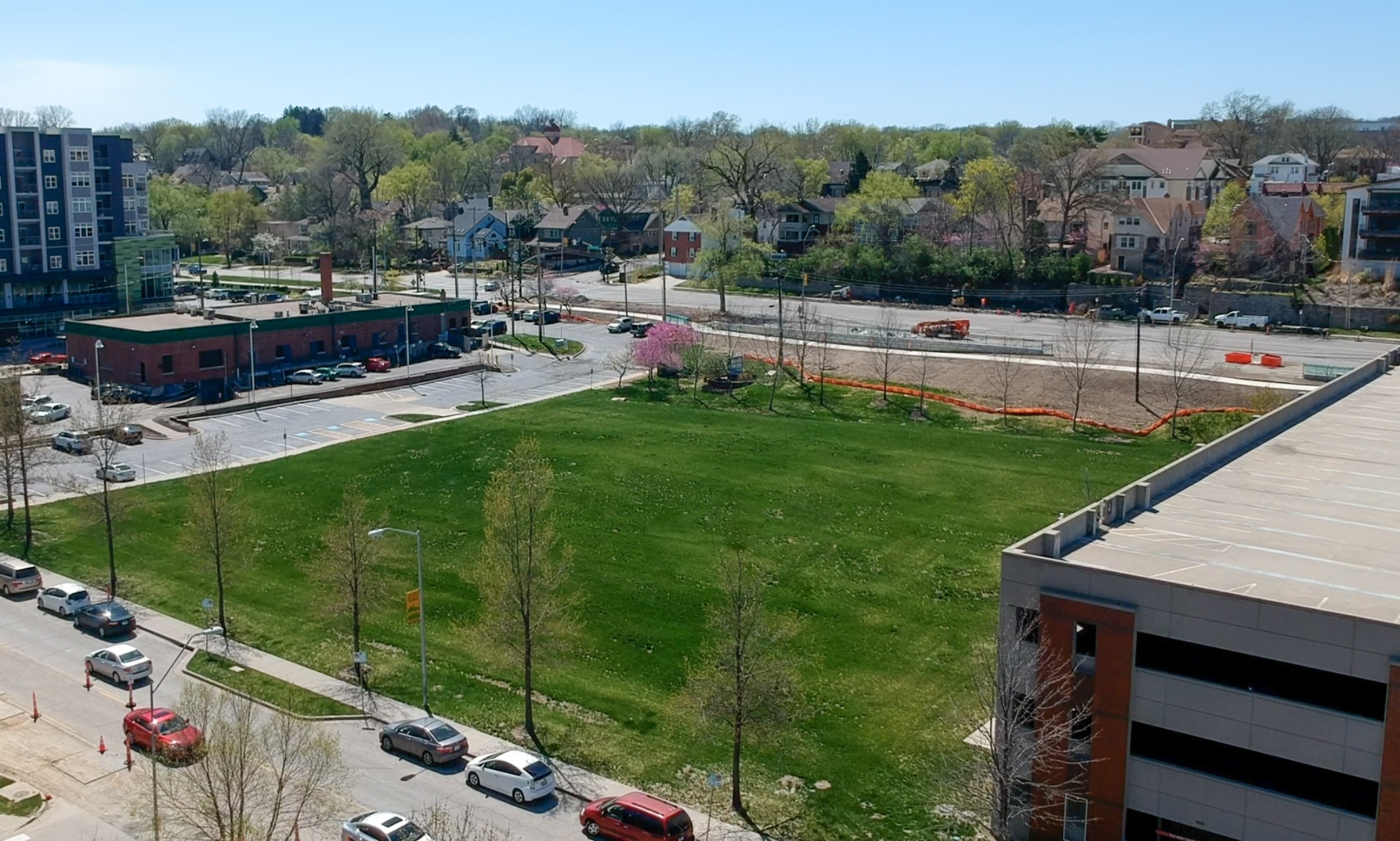
A feasibility study will be conducted on land near the future streetcar terminus
UMKC has paused the request for proposals (RFP) process to develop a five-acre parcel of land next to the south terminus of the Kansas City Streetcar at 51st Street and Brookside Boulevard. University leaders said the proposals came in higher than expected based on the specifications in the RFP and higher than anticipated project costs.
Sean Reeder, vice chancellor of Finance and Administration, said the university isn’t tabling the project. It is simply hitting pause to revise the parameters for the proposed development that would bring a small arena to campus along with retail and other possible uses. The university envisions the project as creating a destination spot for the campus and surrounding community.
UMKC will be conducting a feasibility study in the next few months to determine the right combination of size and programming for the proposed arena and will re-evaluate the opportunity for private development and non-university uses of the available land given current and anticipated market conditions.
Based on current specifications, an analysis of the proposals showed that the proposed private development included in the plans wouldn’t generate enough revenue to cover project costs, Reeder said.
The current RFP will remain open while UMKC completes this analysis. Upon completion of the analysis, the university will re-engage the RFP process with the responding firms this coming spring.
“We still believe the project can be feasible with revised parameters,” Reeder said.
Oct 18, 2023
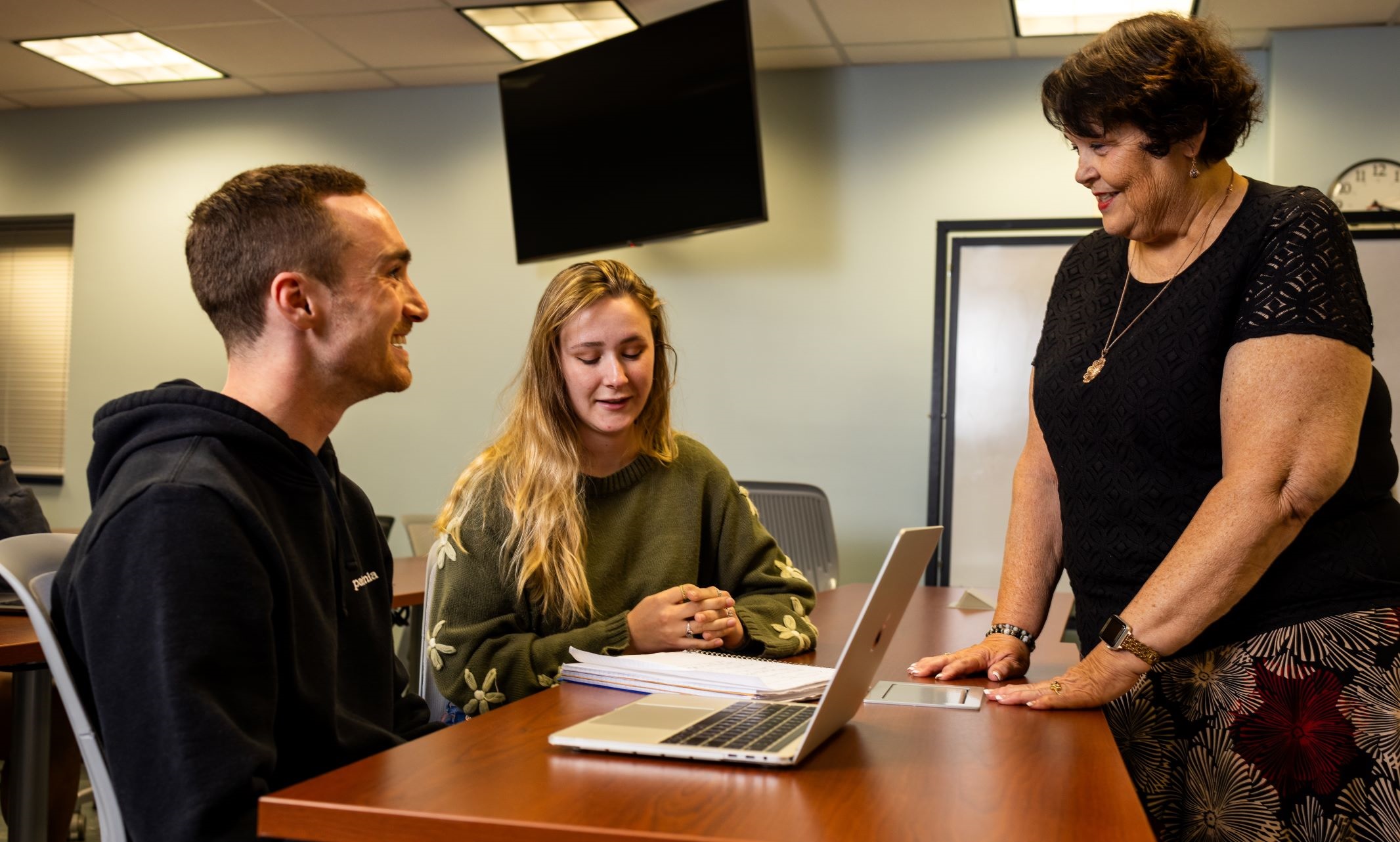
Commercial program and in-person bar preparation course are now included in tuition and fees
Beginning with December 2023 graduates, every juris doctorate student from the UMKC School of Law will receive access to Helix Bar Review, a premier online bar-prep program, as part of their tuition and fees.
The in-person bar preparation course, currently taught by Wanda Temm, a nationally recognized expert on bar passage, is now also free for these graduates.
UMKC School of Law is one of few in the country to provide both a commercial bar preparation program and a supplemental in-person course at no cost to students beyond tuition and fees.
“This is a game-changer for our students,” UMKC School of Law Dean Lou Mulligan said. “Law school is probably the most challenging intellectual exercise they’ll engage in, and the bar exam is the top of that mountain. This initiative ensures that every student has access to these important resources and the best chance to be successful.”
Reputable commercial bar preparation programs cost an average of $4,000, a high expense to ask students to pay before many of them have full-time jobs and one that cannot be paid for with a student loan. This leaves many students to make the difficult choice to take out a commercial loan to pay for a program or try to pass the bar exam without using a program to prepare.
“The reality of bar prep is that some people have to make an economic-driven decision,” said Alexis Denny, a UMKC law student graduating in December. “So they choose the cheapest or free option, don’t enroll in the in-person class and try to go it alone. With this initiative, no student has to choose between paying for bills or a bar prep program.”
Some large law firms pay for bar prep expenses, but students with ambitions in areas of law that don’t pay for bar prep, and likely don’t start at high salaries, are now able to pursue those ambitions with less concern regarding expense. UMKC School of Law prides itself on its ties and service to the Kansas City community, and this is one more way it provides value to that community, as well as its students.
“This initiative is deeply in line with our mission,” Mulligan said. “First-generation and other students with fewer economic means now have access to that resource to succeed. We’re helping to create lawyers who seek a career outside of the private sector such as in public defense, district attorney offices and public service work.”
“I think this is a really great way to help equalize the bar prep experience,” Denny said. “It’s so helpful for everyone, but especially for those who will be in the public or nonprofit sector where there is no support for bar prep costs.”
Faculty and staff at the Law School anticipate that this initiative will increase passage rates for first-time bar takers and inspire confidence from employers that UMKC graduates are prepared to begin work.
“Our students will have all of the resources they need,” Mulligan said. “We support our students from their first day at law school all the way through the bar exam. We’ve got them covered.”
Oct 18, 2023
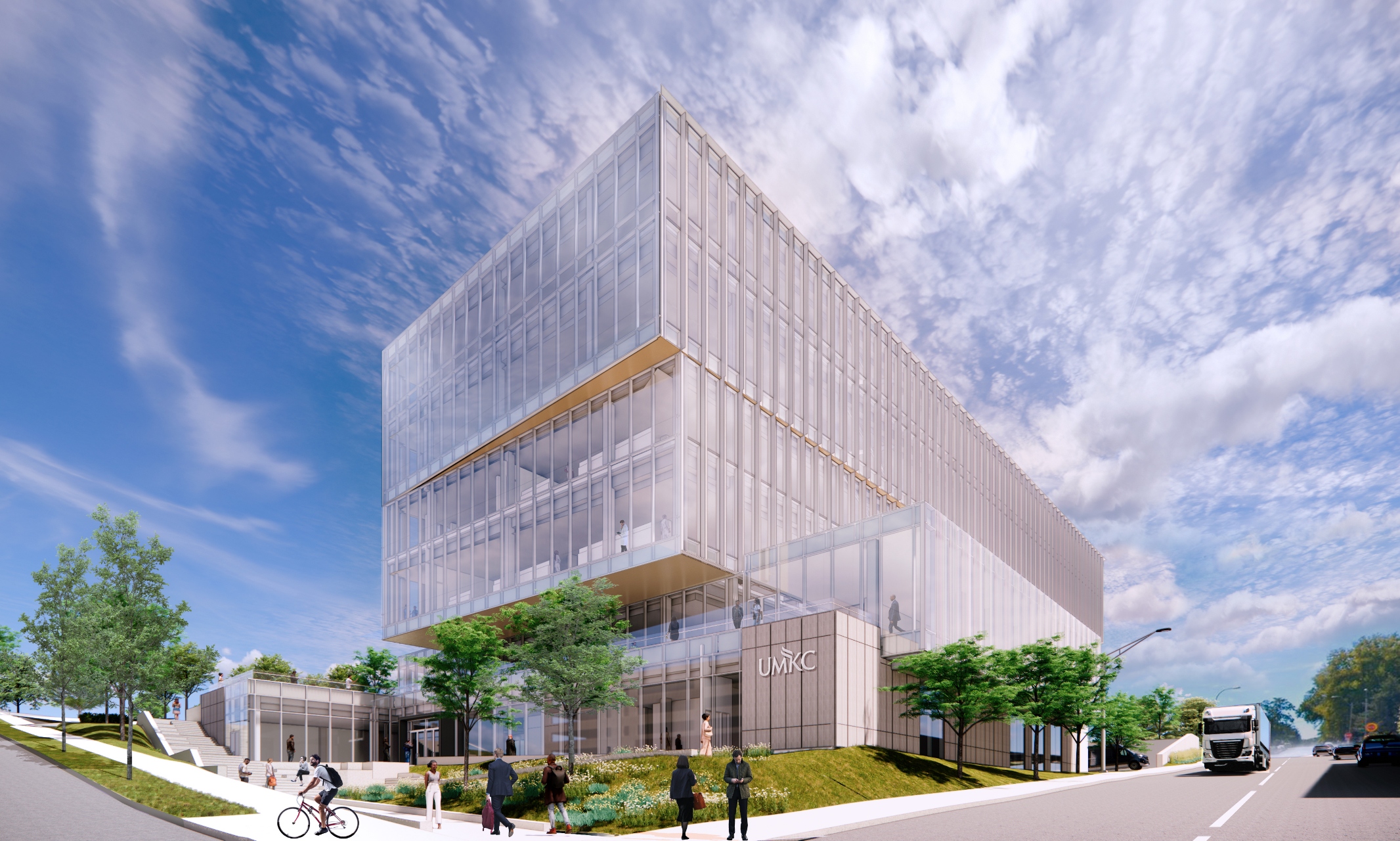
Renderings unveiled for $120 million Healthcare Delivery and Innovation Building
The University of Missouri-Kansas City at a Tuesday event revealed the design of its largest capital investment to date: the $120 million Healthcare Delivery and Innovation Building.
UMKC expects to break ground next year on this new building, with key funding from the state of Missouri and visionary Kansas City donors coming together to support this cornerstone project that will launch a new era for the UMKC Health Sciences District and healthcare access.
The five-story 200,000-square-foot building will be constructed on what is now a parking lot at 25th and Charlotte streets. The project will enable the university to provide state-of-the-art education for the next generation of healthcare providers, find newer and better ways to serve patients in need, strengthen collaborations with surrounding neighborhoods and facilitate greater interdisciplinary partnerships to fuel innovation and research.
UMKC Chancellor Mauli Agrawal speaks at the rendering reveal event. Photos by Brandon Parigo, UMKC
“The new Healthcare Delivery and Innovation Building will be one of a kind,” said UMKC Chancellor Mauli Agrawal. “We know of only one other combined medical and dental education building in the nation, and none other that will include what ours will with a unique combination of collaborative programs focused on elevating healthcare.”
UMKC will house key assets in the building for the following programs:
UMKC School of Dentistry. UMKC is a regional leader in dental education with the only public dental school in the states of Missouri and Kansas. The new building will provide leading-edge pre-doctoral dental clinics, enhancing our ability to graduate top-notch dentists. The new space also means students can serve more patients in need through advanced equipment, greater efficiency, expanded hours for acute dental care and the ability to implement teledentistry. Currently, the School of Dentistry provides $750,000 annually in uncompensated dental care for the community. The new facility will house UMKC acute dental care programs – such as oral surgery, endodontics and emergency procedures – plus program space for radiology, lab work and a high-tech dental design lab to produce crowns, bridges and implants.
UMKC School of Medicine. UMKC has the highest-ranked public medical school in Missouri for primary care. The new facility will allow the School of Medicine to provide cutting-edge simulation labs, including dedicated space to practice essential medical procedures; a full-scale operating room and patient exam rooms to practice patient communication and care. The collaborative learning spaces for students encourage a culture of communication and better prepare them to work with colleagues in their professional lives.
UMKC Health Equity Institute. The institute brings together researchers, government and community organizations to improves the lives of the underserved and bridge healthcare gaps. The institute combines its research strengths with community groups’ grassroots involvement to identify, quantify and reduce those gaps. In the new building, researchers will collaborate to tackle health disparities and provide access to healthcare with initiatives including Our Healthy Jackson County that brings free vaccines, health screenings and other resources into neighborhoods and places of worship. The institute’s new space will include a kitchen lab to teach healthy meal preparation.
UMKC biomedical engineering. In the new building, doctors, dentists and engineers will work side by side, creating faster, more effective collaboration between science, engineering and the medical world. Product development will accelerate in areas such as medical implants, imaging technology and surgery tools, and UMKC can expand access to the in-demand biomedical engineering degree program with potential global impact. On average, a single engineering position creates 1.5 staff jobs and brings 2.5 households to the Kansas City area, positively impacting Kansas City’s economy.
Data Science and Analytics Innovation Center. In partnership with MU and other University of Missouri System universities, UMKC leads a center focused on creating new advances in data sciences and analytics. The new space in the building will provide the center opportunities to focus the power of data science on transforming the way we personalize healthcare. The data center within the new facility will provide high-performance computing for industry, government and nonprofit organizations within our region to solve data-intensive computing problems.
University Health. Our clinical partner will occupy two floors of the new building for office space.
The project is close to being fully funded:
Included in the last two budgets from Governor Mike Parson and passed by the Missouri General Assembly, the state of Missouri has committed $60 million,
The Sunderland Foundation has pledged $30 million,
The Hall Family Foundation will contribute $15 million and
$10 million will come from federal funding secured by former U.S. Senator Roy Blunt.
Groundbreaking will occur in 2024 with project completion expected in 2026.
Oct 17, 2023
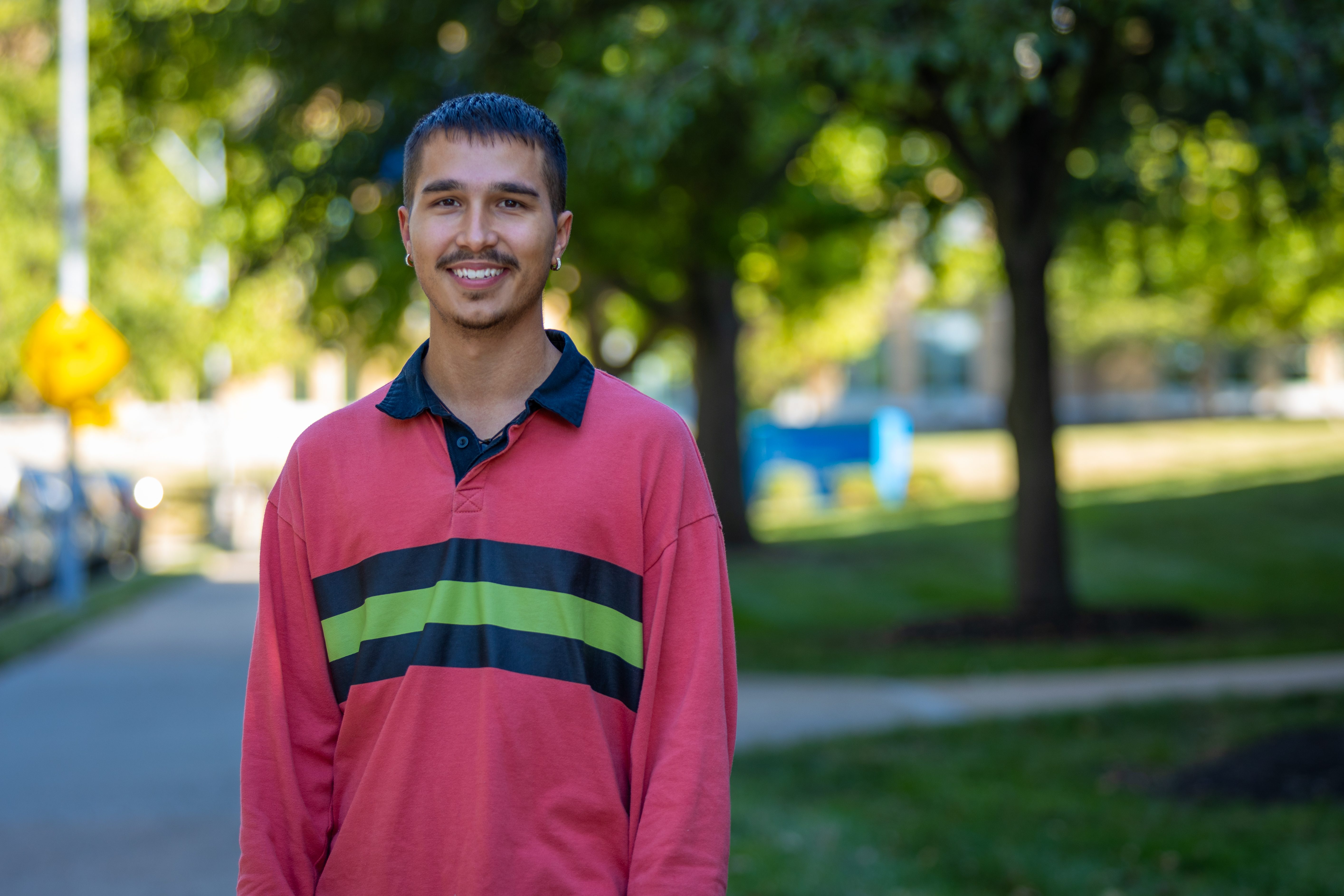
The Institute for Urban Education trains educators who are diverse and inclusive
At UMKC students write their own stories, form their own definitions of success and chart innovative career paths. With Kansas City as their classroom, they turn dreams into reality every day.
Isaia WilcoxenAnticipated graduation: 2024UMKC degree program: B.A. Elementary EducationHometown: Kansas City, Kansas
Isaia Wilcoxen thought he wanted to be a doctor, but his high school teacher’s high expectations and interest in his personal well-being made him change his path.
“My choir director in high school sparked my desire to stay in school,” Wilcoxen said. “She took the time to know who I was and invest in my life. By attending extracurricular activities I participated in and getting to know my family, she truly made an effort to understand who I was as a person. Because of her, I decided for myself that I wanted to do the same for other students.”
Wilcoxen’s mother is also a teacher, and she inspired his choice as well.
“Growing up, she pushed me and my siblings to work hard and never quit, especially in our academics,” he said. “In addition to being a great mom, she was also a great teacher to me. Her warm demeaner and high expectations pushed me to keep trying and keep learning.”
The influence of both women inspired Wilcoxen to aspire to spark that same focus in other students. He started college at a small school in a rural area that lacked diversity, and had few students who shared his experiences.
“I noticed there was no discussion of race and equity,” Wilcoxen said. “Because of this, I quickly realized how necessary diversity is in education.”
Then he learned about the Institute for Urban Education (IUE) at UMKC and decided to transfer.
“The IUE’s mission is to create inclusive and responsive teachers. I knew that I needed to be here,” he said. “I understood what it’s like to not have teachers who look or think like me. In addition, IUE focuses on preparing teachers for urban schools, which is where I want to teach.”
Being on campus at UMKC reaffirmed his decision.
“The IUE’s mission is to create inclusive and responsive teachers. I knew that I needed to be here.” - Isaia Wilcoxen
”My first day on campus, I felt welcomed and accepted to be myself,” Wilcoxen said. “UMKC offers so many clubs, organizations and services for students of color, LGBTQIA students, religious students and so much more. Coming from a small, private school, I was amazed at how inclusive UMKC is. I immediately wanted to get involved and meet new people.”
Currently, Wilcoxen is participating in a paid apprenticeship program teaching at the Academy for Integrated Arts (AFIA.)
“IUE has a lot more practicum opportunities for education students,” he said. “The first semester of our senior year, we're required to go three days to practicum, where other education students usually do one. And we also have more opportunities in the community through volunteering. I've gotten to work at AFIA with their after-school program, which is a paid practicum. It has been a great experience.”
He says people ask him why he chose to focus on urban education.
“The main reason is because urban schools have statistically been underserved and have fewer resources than suburban school districts, or even rural school districts,” Wilcoxen said. “So, there's a lack of teachers, specifically in urban schools because a lot of teachers migrate toward the suburbs, because of better funding and resources. That’s what makes me want to teach in urban schools.”
Oct 17, 2023
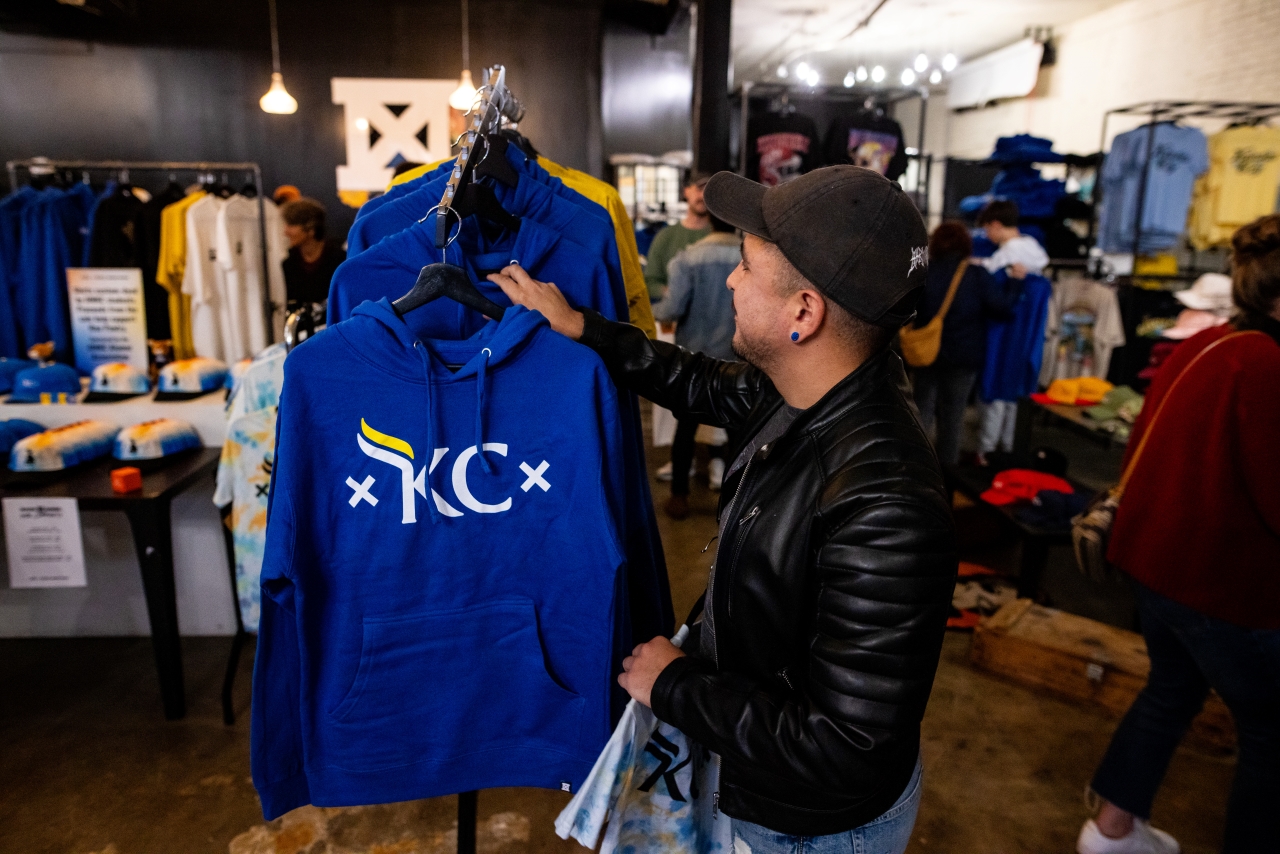
The collaboration includes exclusive Roo-inspired streetwear and UMKC alumni-owned businesses at a pop-up event
The Kansas City community was invited to celebrate the inaugural Roos Mobb collaboration between UMKC and MADE MOBB on October 13 at MADE MOBB’s space in the Crossroads Arts District.
The capsule collection included hats, shirts and sweatshirts with exclusive UMKC designs.
Vu Radley, one of the founders of MADE MOBB, is a UMKC alum. He was joined by over a dozen alumni-owned businesses at the event.
Similar to First Fridays events at their space, there were also performances by various UMKC alumni.
Roos Mobb collection pieces are available for purchase in-store at MADE MOBB’s location until October 31.
Oct 16, 2023
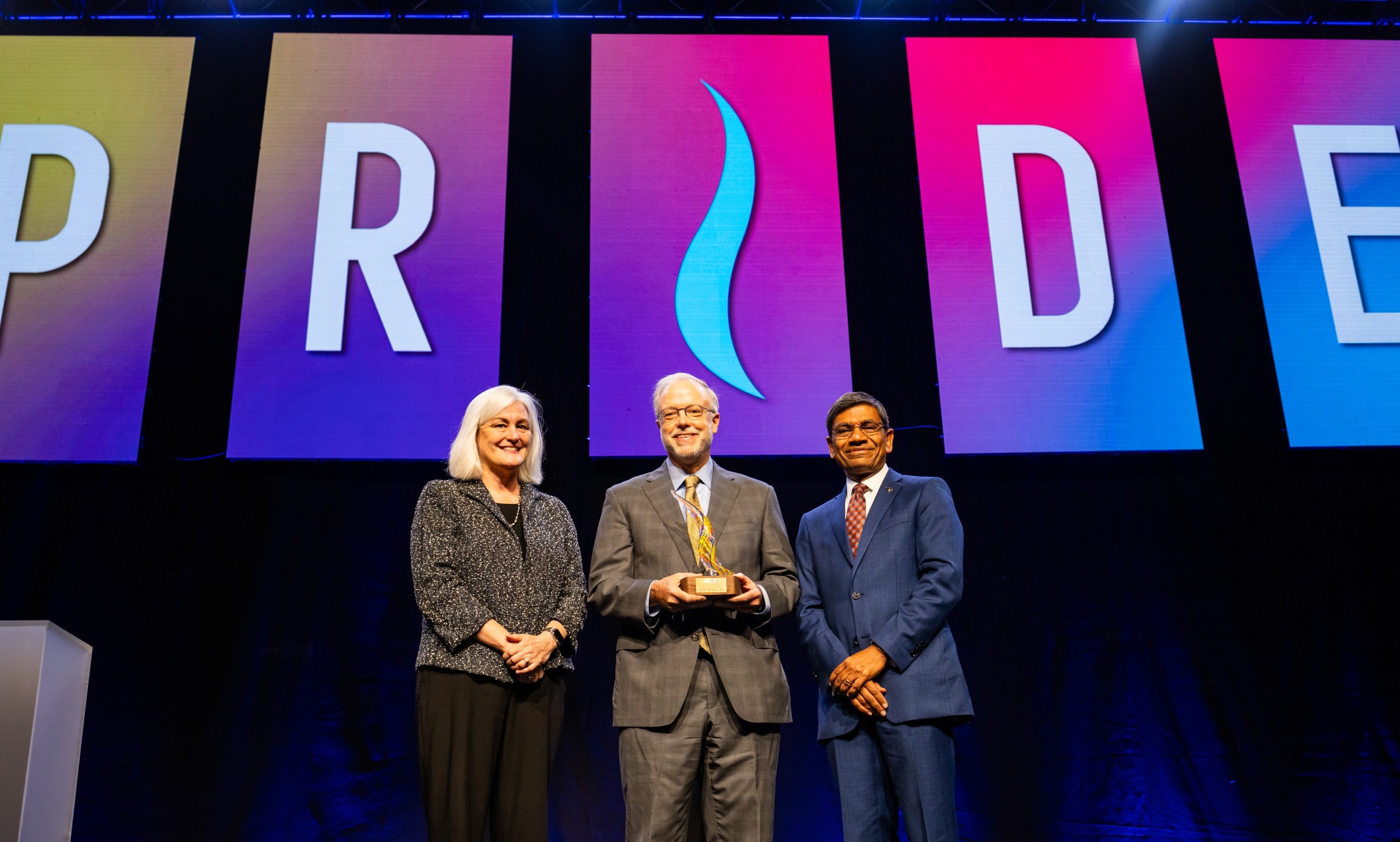
Hall received the inaugural Stephen Metzler Pride Champion Award at the annual event
The annual Pride Breakfast at UMKC is a fundraiser, but it’s also a place to celebrate community and allyship. That’s never been more clear than at this year’s breakfast where the inaugural C. Stephen Metzler Pride Champion Award was given to Hallmark’s Don Hall Jr.
Metzler, a UMKC alumnus, was a noted philanthropist, HIV/AIDS activist, patron of the arts and business leader in the Kansas City community. He was involved in numerous Kansas City non-profits and organizations, including the Mid-America Gay and Lesbian Chamber of Commerce, AIDS Service Foundation of Greater Kansas City and AIDS Walk of Kansas City. A believer in the power of community and connections to create change, Metzler often said he was “saving the world one cocktail party at a time.”
Don Hall Jr., executive chairman of the board of directors and former CEO at Hallmark, was awarded the Metzler Pride Champion Award for his support of the LGBTQIA+ community. During his tenure as CEO, Hall made Hallmark the founding corporate partner of the Mid-America Gay and Lesbian Chamber of Commerce. He was the first CEO to walk in the AIDS Walk of Kansas City and was instrumental in bringing diverse voices to the table across the civic landscape.
Leading a company that serves to foster and celebrate relationships made Hall even more conscious of the need to celebrate people from all walks of life.
“This awareness underscores for me how much harder we have to work for all people to feel valued,” Hall said. “All people need to love and be loved, laugh, celebrate, reach out to others.”
Hall credits Metzler with inspiring him from a young age. He knew Metzler as the older brother of a classmate when he was a child and said that Metzler was kind and affirming even back then.
“I drew inspiration from Steve my whole life,” Hall said. “He was enthusiastic and determined to build understanding. I can’t think of a better example at creating inclusiveness, building humanity and encouraging empathy.”
Since 2008, the Pride Breakfast has raised more than $600,000 to support LGBTQIA+ students at UMKC and serves as a way for the university to show support for, and commitment to, LGBTQIA+ students on campus. Funds from the UMKC Pride Breakfast are critical to support programs and scholarships for LGBTQIA+ students — including the Pride Empowerment Fund, which provides emergency assistance to students who experience financial difficulty due to the loss of family support.
“This event serves as a meaningful reminder that you have champions,” said Chancellor Mauli Agrawal to students. “UMKC and our community see you, we care about you and we support you as you develop as students and valued individuals.”
Oct 10, 2023

Supplemental Instruction helps universities around the world
University of Missouri-Kansas City junior Grace Miller remembers taking Computer Science 101 last year and feeling apprehensive. She’d never coded before.
But then Miller was introduced to Supplemental Instruction, called SI for short, a student-led learning approach UMKC invented 50 years ago. Not to be confused with peer tutoring that’s typically one on one and by assignment, SI is built upon collaborative learning. Research shows that students who study in groups retain 2.5 times more than students who study on their own.
“SI focuses on reinforcement of knowledge,” says Miller, who is majoring in media, art and design. “SI also fosters connection with other students and takes away the loneliness from studying.”
SI proved successful for Miller because not only was she advised she should be an SI leader, she received a 97% in the course. Indeed, a major bragging point of SI is that participating in sessions will boost your grade a half letter to a whole letter.
Read more
Inside Higher Ed: UMKC Has Offered Supplemental Instruction for Five DecadesThe Kansas City Star: This Learning Method Boosts Social Skills - and It Started at UMKC
UMKC junior Grace Miller is an SI leader and participant.
History and global reach
The International Center for Supplemental Instruction is based at UMKC and offers SI resources, training and accreditation to universities throughout the U.S. and around the world.
“I believe that SI has made such an impact in higher education because of the community the collaborative learning environment creates,” says Jessica Pearson, executive director of the International Center for Supplemental Instruction and director of UMKC Academic Support and Mentoring. “Students do not just learn course content and study skills, but they also develop friendships and lasting connections with their classmates and campus.”
In 1973 at UMKC, then-doctoral student, Deanna Martin, created SI out of a critical university need to retain students, keep academic standards high and help students reach their goal of graduating. Martin piloted the first SI program in a human anatomy class at the UMKC School of Dentistry. SI had elements that were attractive to faculty and students. With a budget increase, SI was placed in additional courses.
Other universities started their own SI programs and by 1981, the U.S. Department of Education named SI an Exemplary Education Practice. UMKC has trained faculty and staff from more than 1,500 institutions, including other universities in Missouri and Kansas, from 34 countries around the world.
“I take great pride in the fact that SI originated at UMKC and has now made a significant global impact,” says Kristi Holsinger, Ph.D., senior vice provost for student success at UMKC. “While data clearly demonstrates the positive effects of SI participation on students’ performance in specific courses, its far-reaching influence on nurturing enduring skills, such as effective learning strategies, critical thinking abilities and enhanced study habits, is truly immeasurable.“
Key components and results
Programs around the world share fundamentals.
SI:
Targets historically difficult courses, those that have a high percentage of D, F and withdraw
Does not identify struggling students; all students in each course are highly encouraged to attend SI sessions.
Is voluntary, and students can choose when they want to attend.
Employees are trained extensively, and the program supervises SI leaders throughout the semester.
Among the accredited universities is Georgia College and State University, which this year celebrated its 10th anniversary of SI and nearly a third of the university’s students use it. In the spring of 2023, 50% of Georgia College students attended SI sessions for classes that are difficult to pass. Of the students who attended SI sessions, only 11% dropped, withdrew or failed the class compared to 27% of those who did not participate in SI.
Purdue University uses SI and says this about the approach: “SI is a low-stakes environment (you won’t be graded!), so don’t be embarrassed to make a mistake or be confused. The leader will use several tools to give you the opportunity to think more critically about course content and develop a deeper understanding of how different concepts connect to one another. This could include small group discussions, games and other hands-on activities to make content practice more fun. Although the leader might not directly answer a question you ask, they will help you to find the answer yourself, which in the long run will be more beneficial to your learning.”
SI now at UMKC
UMKC sophomore Shekhar Gugnani is an SI leader and participant.
Sophomore Shekhar Gugnani, who is pursuing the six-year B.A./M.D. from the UMKC School of Medicine, says SI is his favorite part of the day at UMKC, both as an SI participant and leader.
“It makes learning fun,” he says. “It provides limitless creative freedom to reinforce the content.”
Gugnani credits SI for his success in the historically challenging Anatomy 219 course his freshman year. This semester, he’s both an SI leader for Anatomy 219 and an SI participant in Medical Biochemistry BMS 9265.
During each SI study session – typically an hour twice a week – SI leaders like Gugnani and Miller provide strategies for notetaking, organization and test preparation. They lead discussions and activities over lecture material to review and prepare students for higher levels of success in the class.
To prepare for sessions, SI leaders attend all class meetings, take notes, read and understand assigned materials and communicate with the respective professor and SI supervisor. SI is designed to be collaborative, involving all members of the session in hands-on, participatory learning.
For example, Miller plans to lead an SI discussion in Computer Science 101 about CSV (comma-separated values) files with large datasets of Netflix programming and students will learn how to organize them by cross referring them with their favorite actors. Gugnani led a recent Anatomy 219 SI session by having teams draw bones in a race.
“Students are excited, and they engage with SI,” Gugnani says. “Because of the non-remedial approach, there’s no stigma to it. It’s good for all students.”
So why is SI still strong 50 years later?
“SI has not stopped working all these years later because the challenges it was designed to address remain the same,” Pearson says. “Many students entering colleges and universities do not understand how to learn effectively in a college setting. We need a space for students to learn how to learn. SI offered that 50 years ago and it still offers it today.”
Oct 10, 2023
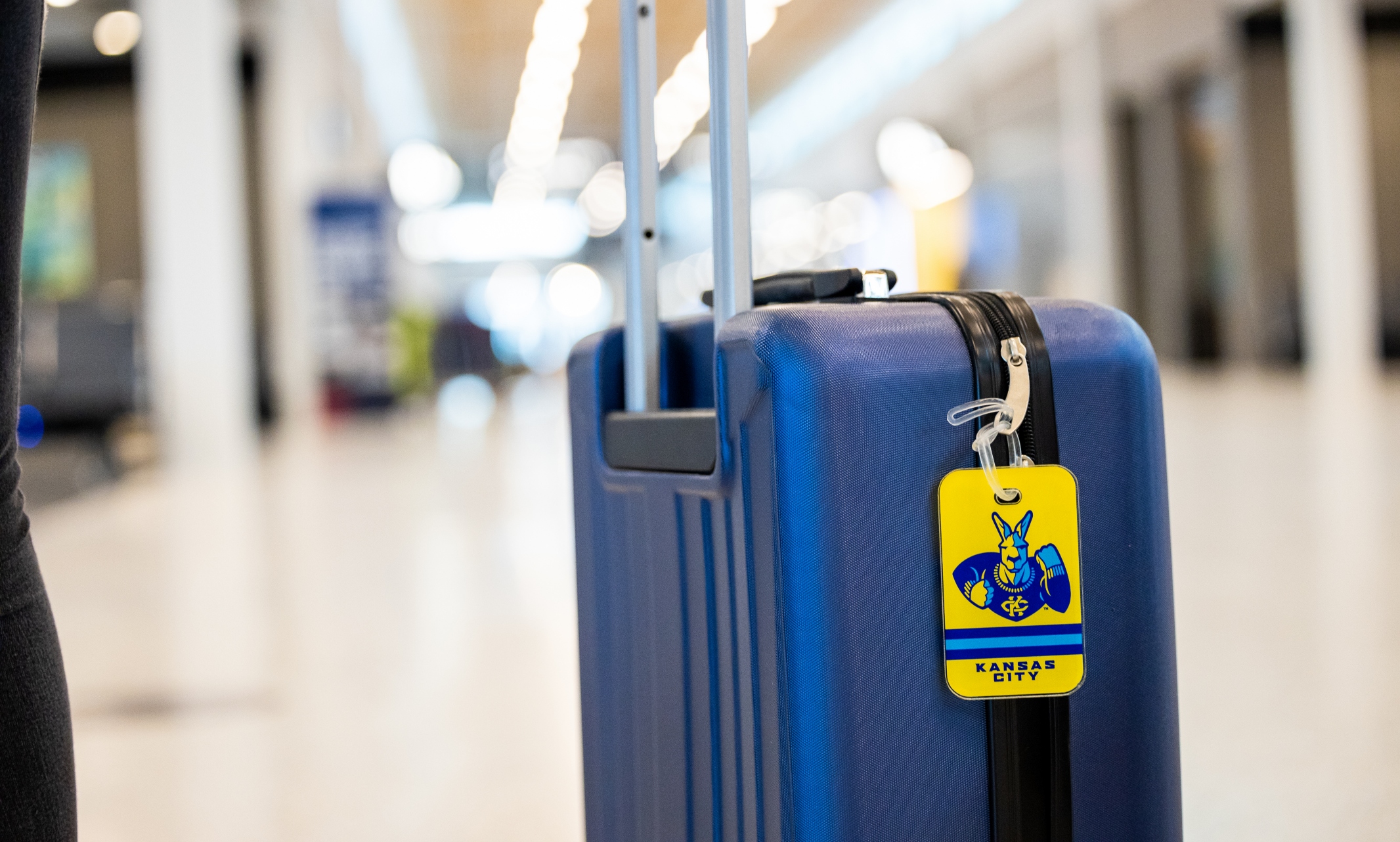
UMKC professor’s KC connection provides once-in-a-career opportunity to students
Msgana Zegeye recalls the moment she was asked to assemble the dream team.
“Validating, that's the word,” she recalled, describing when Bloch Consulting Lab adviser Marvin Carolina asked her to form a team in her image to work with Vantage Airport Group, the concession developer and manager for the new $1.5 billion Kansas City International Airport terminal.
“I think Marvin really saw my passion for leading, managing and operations,” said Zegeye.
She got to work and landed on a four-person team to help advise the company. At first they worked on staffing solutions for the new terminal, but they were so successful, the general manager, Lovell Holloway, kept the team on board and expanded their scope of work.
Zegeye had never worked with any of the peers she selected, but she’d seen them in action in the mock consulting activities in the Consulting Lab. From that, she was able to recognize each of their strengths and envision how those strengths could be deployed to help Vantage Airport Group.
“Nicolas, I felt like would be really good at marketing. He's very innovative.” “With Erik, he is super analytical, and finance is his avenue.”
“Henry really likes like logistics. He likes making sure we do everything by the book and in order.” The team got to work, helping vendors at the airport navigate all their business licenses, airport-specific safety regulations and hiring and retainment strategies for their employees.
As time went on, Holloway entrusted more responsibilities to the team, including conducting an economic impact study and developing an internship program for Vantage Airport Group to further its work with students. Despite the group’s youth, Holloway said he never doubted their capabilities.
“I'm very fortunate and humbled to be working with these students in the Bloch school," Holloway said. "They've been very great to work with, they've been willing to learn, they have educated us. They add value and have great energy. They're easy human beings to work with, and I'm fortunate as a leader to be able to be entrusted with their careers and their vision of where they want to go in life in the future.”“It was a really cool experience because we got to see how we're helping them firsthand, and that they were actually going to take our advice and learn from it,” Hartung said.
Everyone on the team agrees, the guidance, support and trust from Vantage Airport Group and Holloway, and being allowed to take risks and make mistakes on a real-world project taught them invaluable lessons. “The experience itself is something I would never have thought I would have been able to get at any university because this type of project doesn't really happen all that often,” said Klaas. “UMKC has provided a tremendous amount of opportunity,” Hartung agreed. “I think that's all Kansas City’s about, all the opportunity that it holds for students.”
Oct 03, 2023
